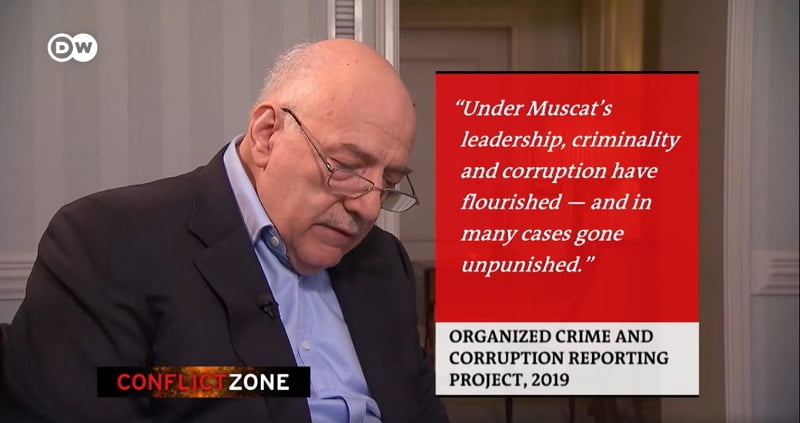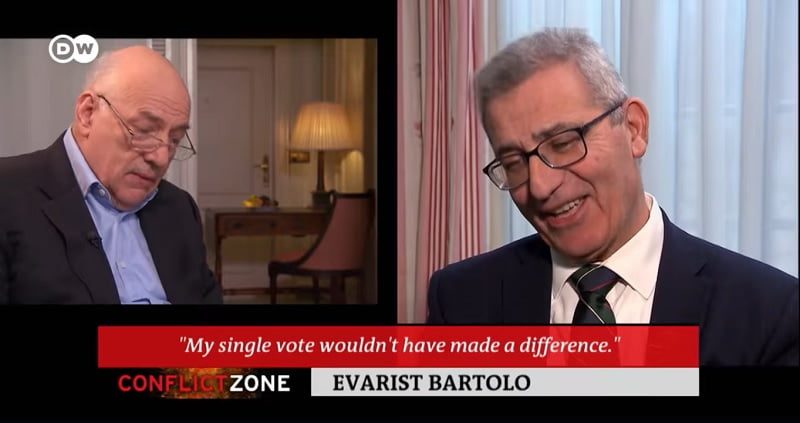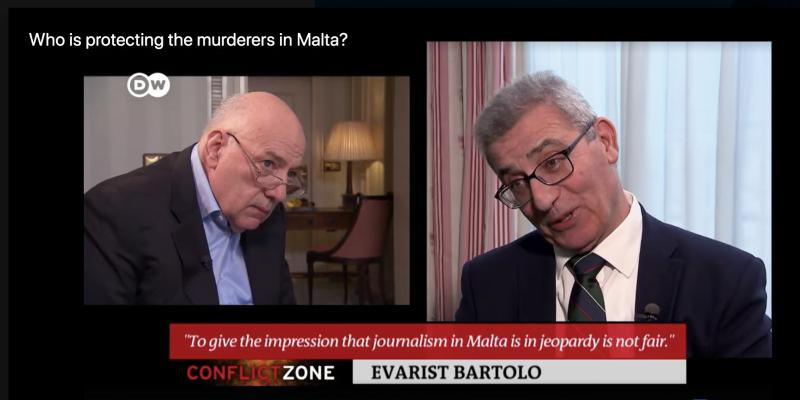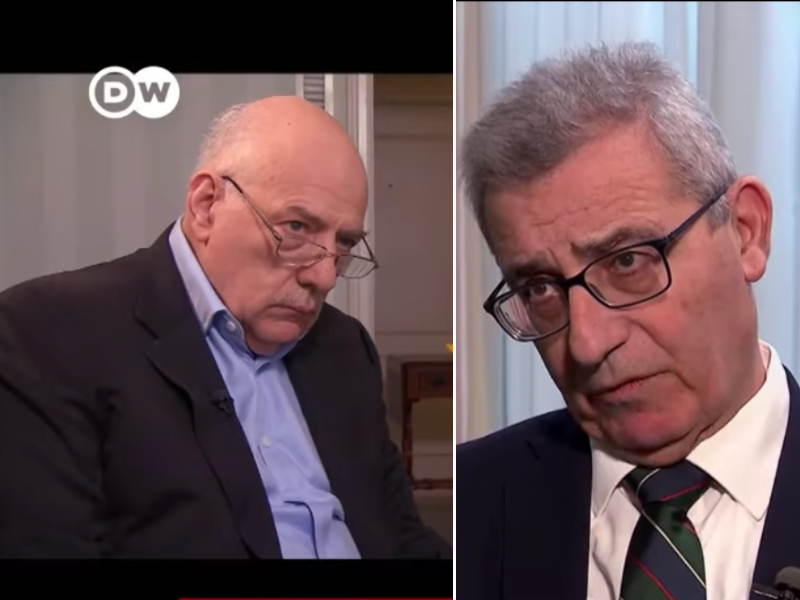After almost seven years of the Labour Party in government, a minister has openly admitted in an interview that the secret online Labour Facebook groups set up to dehumanise journalist Daphne Caruana Galizia before and after her death were “unacceptable”.
But, with this admission out of the way, Foreign Affairs Minister Evarist Bartolo was quick to explain away this the phenomenon as “part of the local political culture”.
This excuse was not enough for seasoned journalist Tim Sebastian, who quickly fired back: “Is it part of the local political culture to celebrate her assassination, calling her relatives a family of animals?”
In a 30-minute interview aired in investigative programme Conflict Zone on German broadcaster DW, Sebastian grilled Bartolo about Caruana Galizia’s death, corruption and rule of law in Malta, leaving him looking distinctly uncomfortable and, at times, embarrassed.
Sebastian referred to The Shift’s six-month investigation into the secret Labour groups, run and administered by Labour and government officials, that dehumanised Caruana Galizia with people celebrating her murder. He asked Bartolo whether he was proud of this part of the Labour Party.
“Definitely not and it’s totally unacceptable – I made it very clear that it was totally unacceptable… I’m at least happy that, in the last month, even the national memorial to her has not been disturbed at all and I really hope that…”. But before he could finish his sentence, Sebastian swiftly interjected and asked him whether stopping the desecration of her memorial was something to celebrate.
Bartolo said he hoped there would be a monument to Caruana Galizia for her work in investigating corruption.
On corruption
Sebastian did not mince his words, starting the interview by asking Bartolo why he had supported the government of former prime minister Joseph Muscat, which was “rotten to the core” – a government, Sebastian said, that had created “a swamp of corruption and murder”.
The minister insisted he had always made it clear that he had found the situation “unacceptable” from 2016 when the Panama Papers came out. He also said that he now realises that he should have resigned in 2016.
“Yes, I have said, recently that, perhaps, it would have been wiser to resign in 2016 as a form of pressure to change things. I acknowledge that but I have spoken even over the last four years against what you have just said,” Bartolo said.
He argued that his cryptic Facebook posts were not vague but sent a very clear message that could be interpreted by Maltese society where everyone knew everyone.

When asked about the OCCRP award to Muscat as 2019’s most corrupt person, Bartolo said he had warned Muscat to get rid of the people mentioned in the Panama Papers. This advice was ignored and Muscat paid “a huge price”.
Muscat was someone who had contributed to the country’s economic growth and it was a pity that his record was then tainted with that award, Bartolo said.
But Sebastian wasn’t having any of it. “Just because the economy was booming.”
“No, of course,” Bartolo replied.
“…murder and corruption were also booming at the time,” Sebastian said.
On rule of law
Bartolo said the rule of law in Malta was second to what he described, as “the rule of friends”. This situation was created because Malta was a small country where personal networks and relationships were stronger than institutional ones.
“The rule of family and the rule of friends is stronger than the rule of law,” the Foreign Affairs Minister said.
He excused the Muscat government’s failure to uphold the rule of law by saying there were no boundaries between families and friends and institutions, describing it as “very porous”.
“All I’m saying is that in our society it is a tougher, more formidable challenge that there is the rule of law… that there are rules, regulations,” he said to an incredulous Sebastian.
Bartolo was pressed on why he did not take a stronger stand against former minister Konrad Mizzi, choosing instead to support him in a no confidence vote in parliament.
His reply was that the motion had amendments that would allow increased accountability and that his single vote “would not have made a difference”.
“Every single vote does,” Sebastian hit back.

Bartolo admitted he did not stick with his principles but “I tried to use that to negotiate measures to hold the government to account… I had a survival strategy where I could fight another battle.”
Bartolo stayed on even after Muscat’s government continued to give the same key people “a free pass” after these were mentioned in the Electrogas deal, the Hillman inquiry, Panama Papers, Vitals and golden passport. “None of that was serious enough for you to say you’ve crossed my red lines many, many times,” Sebastian said.
The Foreign Minister said he had decided to take a stand and “make it clear I was going to resign in November” when Yorgen Fenech was arrested as the mastermind behind Caruana Galizia’s assassination. At the time, civil society protests were being held on almost a daily basis, calling for Muscat’s resignation.
Turning to investigations, Bartolo said that the “biggest problem” and the “weakest link” was the economic crimes unit in the police force. “Unless that is beefed up and resourced with really well-qualified people of integrity, this problem will remain because ultimately we are going to be judged on how many people will be prosecuted”.
“You know much, much more than you are telling, don’t you? More than you ever told… you know names, you know places, you know where the bodies are buried, don’t you?” Sebastian asked the Foreign Minister who kept repeating he was pushing for the truth to come out.
“I am doing my duty in my own way,” Bartolo said.
When Sebastian referred to judicial appointments, described by the Parliamentary Assembly of the Council of Europe as “incompatible with judicial independence and the rule of law”, Bartolo said the appointments have been “more independent of the executive than ever before”.
The new government started taking on the recommendations by the Venice Commission to implement them, Bartolo said. “You’ve started? How difficult is it?” Sebastian asked.
On press freedom
When asked about freedom of the press in Malta and the “continuous attacks,” Bartolo said the challenges faced by the press in the country were related to it being a “micro State” and so media houses needed political parties behind them to survive even as Sebastian questioned the sanity of political parties dominating the media landscape.

Bartolo denied there were attacks on journalists in the country, even as the public inquiry continues to reveal evidence of how OPM staff sharing posts on social media discrediting and dehumanising critics, including journalists.
Sebastian confronted the Foreign Minister with statements by international NGOs, and Malta’s declining press freedom ranking, asking: “So they don’t know what they’re talking about?”
Bartolo insisted the government had “liberalised freedom of the press and laws that regulate the press” in the last seven years, mainly referring to the removal of criminal libel and ignoring the fact that at the time of her death Caruana Galizia was facing over 40 libel cases, the majority of which were filed by politicians and which are still ongoing more than two years after she was killed.
He described Maltese journalism as very “robust” and a very “strong criticism” of what goes on. It was a big challenge to have a media system in Malta that formed part of the checks and balances in a democratic society, he said, “but I repeat, that is coming out of the reality of a micro State”.
“Is that an excuse? Because Malta is small?”
You can watch the full interview here.













